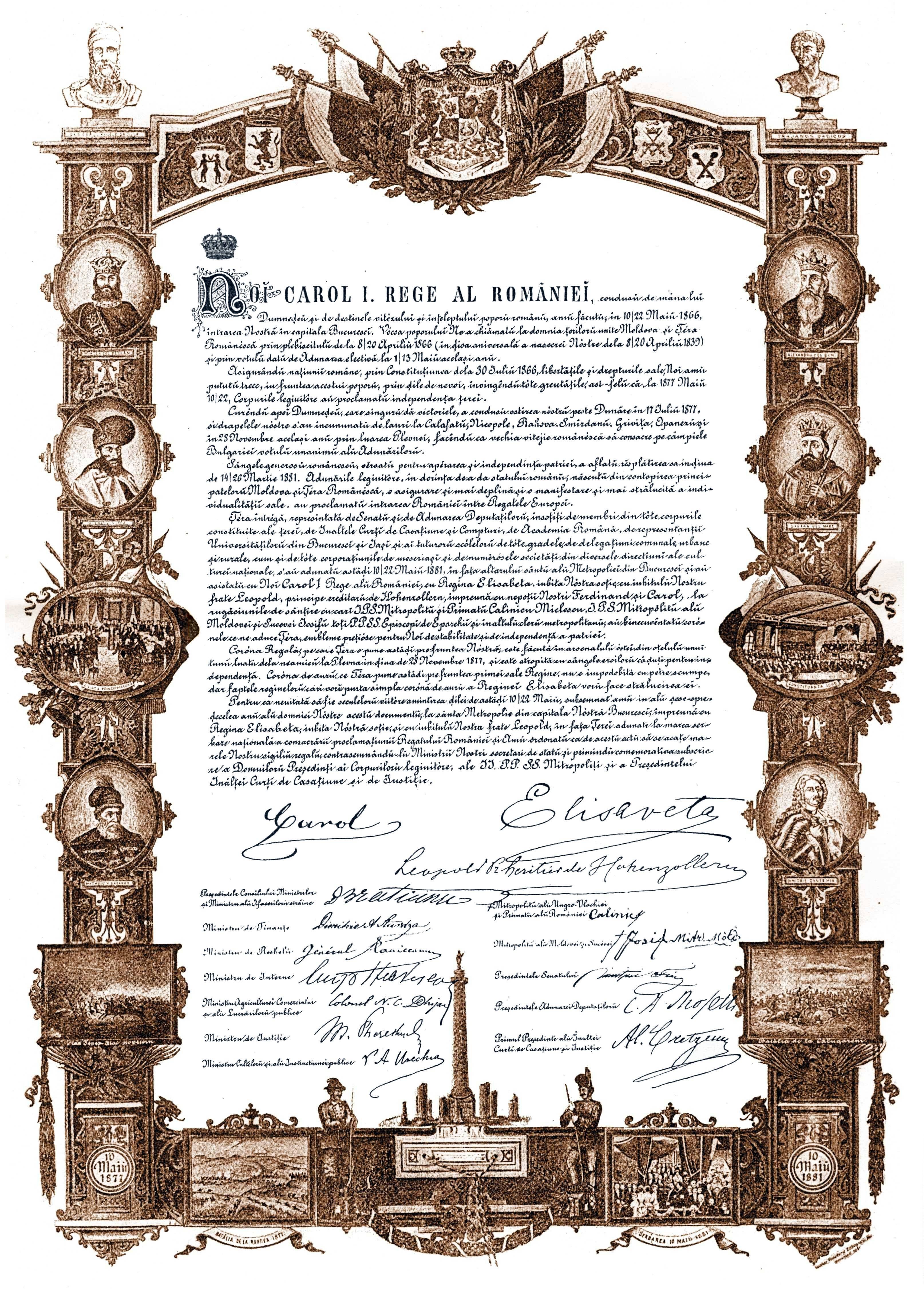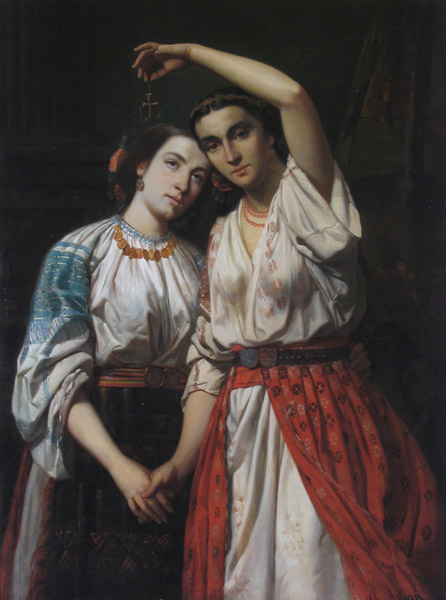|
Eugeniu Stătescu
Eugeniu Stătescu (25 December 1836 – 30 December 1905) was a Romanian politician who served as the Minister of Internal Affairs from 10 April 1881 until 8 June 1881 and as Minister of Foreign Affairs from 9 June 1881 until 30 July 1881 during the existence of the United Principalities. He was one of the signatories of the Act of Proclamation of the Kingdom of Romania signed by King King is a royal title given to a male monarch. A king is an Absolute monarchy, absolute monarch if he holds unrestricted Government, governmental power or exercises full sovereignty over a nation. Conversely, he is a Constitutional monarchy, ... Carol I and Queen Elisaveta. See also * Foreign relations of Romania 1836 births 1905 deaths Politicians from Bucharest National Liberal Party (Romania) politicians Ministers of foreign affairs of Romania Ministers of interior of Romania Ministers of justice of Romania Presidents of the Senate of Romania {{Romania-politician ... [...More Info...] [...Related Items...] OR: [Wikipedia] [Google] [Baidu] |
Ministry Of Administration And Interior (Romania)
The Ministry of Internal Affairs of Romania () is one of the eighteen ministries of the Government of Romania. From 23 August 1944 to 18 March 1975 the ministry held the title of ''Minister of Internal Affairs'', between 2004 and 2007, held the title of ''Minister of Administration and Interior'', and since April 2007, ''Minister of Interior and Administrative Reform''. In December 2008, the Boc government changed the name back to ''Ministry of Administration and Interior''. Until 2006, the ministry was housed near Lipscani in ''Palatul Vama Poştei'', built between 1914 and 1926 according to the architect Statie Ciortan's plans. In 2006 the ministry moved into the former building of the Senate on Revolution Square. Subordinated structures Within Romania, the following structures are subordinated to the Ministry of Internal Affairs: * Romanian Police * Romanian Gendarmerie * Romanian Border Police * General Inspectorate for Emergency Situations * General Inspectorate for ... [...More Info...] [...Related Items...] OR: [Wikipedia] [Google] [Baidu] |
King Of Romania
The King of Romania () or King of the Romanians () was the title of the monarch of the Kingdom of Romania from 1881 until 1947, when the Romanian Workers' Party proclaimed the Romanian People's Republic following Michael I's forced abdication. History The state had been internationally recognized as a principality since 1862, after the creation of the United Principalities, a personal union between Moldavia and Wallachia, at that time vassal states of the Ottoman Empire. Alexander I became '' domnitor'' (ruling prince) after the official unification of the two formerly separate states, being elected prince of both states in 1859. He was deposed in 1866 by a broad coalition of the main political parties, after which parliament offered the throne to Prince Karl of Hohenzollern-Sigmaringen who subsequently became the new "Domnitor of Romania" (as Carol I). Romania's independence from the Ottoman Empire was recognized in 1878 by the Treaty of Berlin. In an expression of ful ... [...More Info...] [...Related Items...] OR: [Wikipedia] [Google] [Baidu] |
Ministers Of Interior Of Romania ''
{{disambiguation ...
Minister may refer to: * Minister (Christianity), a Christian cleric ** Minister (Catholic Church) * Minister (government), a member of government who heads a ministry (government department) ** Minister without portfolio, a member of government with the rank of a normal minister but who doesn't head a ministry ** Shadow minister, a member of a Shadow Cabinet of the opposition ** Minister (Austria) * Minister (diplomacy), the rank of diplomat directly below ambassador * Ministerialis, a member of a noble class in the Holy Roman Empire * ''The Minister'', a 2011 French-Belgian film directed by Pierre Schöller See also *Ministry (other) *Minster (other) *''Yes Minister ''Yes Minister'' is a British political satire sitcom written by Antony Jay and Jonathan Lynn. Comprising three seven-episode series, it was first transmitted on BBC2 from 1980 to 1984. A sequel, ''Yes, Prime Minister'', ran for 16 episodes f ... [...More Info...] [...Related Items...] OR: [Wikipedia] [Google] [Baidu] |
National Liberal Party (Romania) Politicians
National Liberal Party may refer to: Active parties * National Liberal Party (El Salvador) * National Liberal Party (Lebanon) * National Liberal Party (Moldova) * National Liberal Party (Romania) * National Liberal Party (UK, 1999) Defunct parties * National Liberal Party (Australia) * National Liberal Party (Bermuda) * National Liberal Party (Bulgaria) * National Liberal Party (Denmark) * National Liberal Party (Estonia) * National Liberal Party (Germany), 1867–1918 * National Liberal Party (Hawaii) * National Liberal Party (Hungary) * National Liberal Party (Kingdom of Bohemia), known as Young Czech Party, 1874–1918 * National Liberal Party (Romania, 1875), a dissolved party in Romania * National Liberal Party-Brătianu, Romania, 1930–1938 * National Liberal Party–Tătărescu, Romania, 1944–1950 * National Liberal Party (UK, 1922), 1922–1923, led by David Lloyd George, merged with UK Liberal Party * National Liberal Party (UK, 1931), 1931–1968, merged ... [...More Info...] [...Related Items...] OR: [Wikipedia] [Google] [Baidu] |
Politicians From Bucharest
A politician is a person who participates in policy-making processes, usually holding an elective position in government. Politicians represent the people, make decisions, and influence the formulation of public policy. The roles or duties that politicians must perform vary depending on the level of government they serve, whether local, national, or international. The ideological orientation that politicians adopt often stems from their previous experience, education, beliefs, the political parties they belong to, or public opinion. Politicians sometimes face many challenges and mistakes that may affect their credibility and ability to persuade. These mistakes include political corruption resulting from their misuse and exploitation of power to achieve their interests, which requires them to prioritize the public interest and develop long-term strategies. Challenges include how to keep up with the development of social media and confronting biased media, in addition to discrimi ... [...More Info...] [...Related Items...] OR: [Wikipedia] [Google] [Baidu] |
1905 Deaths
As the second year of the massive Russo-Japanese War begins, more than 100,000 die in the largest world battles of that era, and the war chaos leads to the 1905 Russian Revolution against Nicholas II of Russia (Dmitri Shostakovich, Shostakovich's Symphony No. 11 (Shostakovich), 11th Symphony is subtitled ''The Year 1905'' to commemorate this) and the start of Revolution in the Kingdom of Poland (1905–07), Revolution in the Kingdom of Poland. Canada and the U.S. expand west, with the Alberta and Saskatchewan provinces and the founding of Las Vegas. 1905 is also the year in which Albert Einstein, at this time resident in Bern, publishes his four Annus Mirabilis papers, ''Annus Mirabilis'' papers in ''Annalen der Physik'' (Leipzig) (March 18, May 11, June 30 and September 27), laying the foundations for more than a century's study of theoretical physics. Events January * January 1 – In a major defeat in the Russo-Japanese War, Russian General Anatoly Stessel su ... [...More Info...] [...Related Items...] OR: [Wikipedia] [Google] [Baidu] |
1836 Births
Events January–March * January 1 — Hill Street Academy is named Colombo Academy and acquired by the Government, establishing the first public school in Sri Lanka. * January 1 – Queen Maria II of Portugal marries Prince Ferdinand Augustus Francis Anthony of Saxe-Coburg-Gotha. * January 5 – Former U.S. Representative Davy Crockett of Tennessee arrives in Texas to join the Texan fight for independence from Mexico. * January 12 ** , with Charles Darwin on board, reaches Sydney. ** Will County, Illinois, is formed. * February 8 – London and Greenwich Railway opens its first section, the first railway in London, England. * February 23 – Texas Revolution: The Battle of the Alamo begins, with an American settler army surrounded by the Mexican Army, under Santa Anna. * February 25 – Samuel Colt receives a United States patent for the Colt revolver, the first revolving barrel multishot firearm. * March 1 – Texas Revolution – Convention of 1836: Delegate ... [...More Info...] [...Related Items...] OR: [Wikipedia] [Google] [Baidu] |
Foreign Relations Of Romania
The foreign relations of Romania is the policy arm of the government of Romania which guides its interactions with other nations, their citizens, and foreign organizations, as well as its status as a member of the European Union (EU), the North Atlantic Treaty Organization (NATO), and other key international organizations. Since the end of the Cold War and the 1989 Romanian Revolution, Romania has pursued a foreign policy centered on Euro-Atlantic integration, joining NATO in 2004 and the EU in 2007. Prioritizing multilateralism, collective security, and democratic values, Romania maintains active diplomatic relations with neighboring states, including Ukraine, Moldova, Hungary, and Bulgaria, while fostering regional cooperation through initiatives such as the Black Sea Economic Cooperation (BSEC) and the Three Seas Initiative. Romania is classified by scholars and international relations experts as a middle power, a designation reflecting its moderate but influential role in i ... [...More Info...] [...Related Items...] OR: [Wikipedia] [Google] [Baidu] |
Elisabeth Of Wied
Elisabeth of Wied (Pauline Elisabeth Ottilie Luise; 29 December 18432 March 1916) was the first Queen of Romania as the wife of King Carol I from 15 March 1881 to 27 September 1914. She had been the princess consort of Romania since her marriage to then-Prince Carol on 15 November 1869. Elisabeth was born into a German noble family. She was briefly considered as a potential bride for the future British king Edward VII, but Edward rejected her. Elisabeth married Prince Carol of Romania in 1869. Their only child, Princess Maria of Romania (1870–1874), Princess Maria, died aged three in 1874, and Elisabeth never fully recovered from the loss of her daughter. When Romania became a Kingdom of Romania, kingdom in 1881, Elisabeth became queen, and she was crowned together with Carol that same year. Elisabeth was a prolific writer under the name Carmen Sylva. Family and early life Born at :File:Schloss_Monrepos_Neuwied.jpg, Castle Monrepos in Neuwied, she was the daughter of Hermann ... [...More Info...] [...Related Items...] OR: [Wikipedia] [Google] [Baidu] |
United Principalities Of Moldavia And Wallachia
The United Principalities of Moldavia and Wallachia (), commonly called United Principalities or Wallachia and Moldavia, was the personal union of the Principality of Moldavia and the Principality of Wallachia. The union was formed on when Alexandru Ioan Cuza was elected as the '' Domnitor'' (Ruling Prince) of both principalities. Their separate autonomous vassalage in the Ottoman Empire continued with the unification of both principalities. On , Moldavia and Wallachia formally united to create the Romanian United Principalities, the core of the Romanian nation state. In February 1866, Prince Cuza was forced to abdicate and go into exile by a political coalition led by the Liberals; the German prince Karl of Hohenzollern-Sigmaringen was offered the Throne and, on he entered Bucharest for the first time. In July the same year, a new constitution came into effect, giving the country the name of Romania; internationally, this name was used only after 1877, since at the time it ... [...More Info...] [...Related Items...] OR: [Wikipedia] [Google] [Baidu] |
Carol I Of Romania
Carol I or Charles I of Romania (born Karl Eitel Friedrich Zephyrinus Ludwig von Hohenzollern-Sigmaringen; 20 April 1839 – ), was the monarch of Romania from 1866 to his death in 1914, ruling as Prince (''Domnitor'') from 1866 to 1881, and as King from 1881 to 1914. He was elected Prince of the Romanian United Principalities on 20 April 1866 after the overthrow of Alexandru Ioan Cuza by a palace coup d'état. In May 1877, Romania was proclaimed an independent and sovereign nation. The defeat of the Ottoman Empire (1878) in the Russo-Turkish War secured Romanian independence, and he was proclaimed King on . He was the first ruler of the Hohenzollern-Sigmaringen dynasty, which ruled the country until the proclamation of a socialist republic in 1947. During his reign, Carol I personally led Romanian troops during the Russo-Turkish War and assumed command of the Russo/Romanian army during the siege of Plevna. The country achieved internationally recognized independence via the ... [...More Info...] [...Related Items...] OR: [Wikipedia] [Google] [Baidu] |







